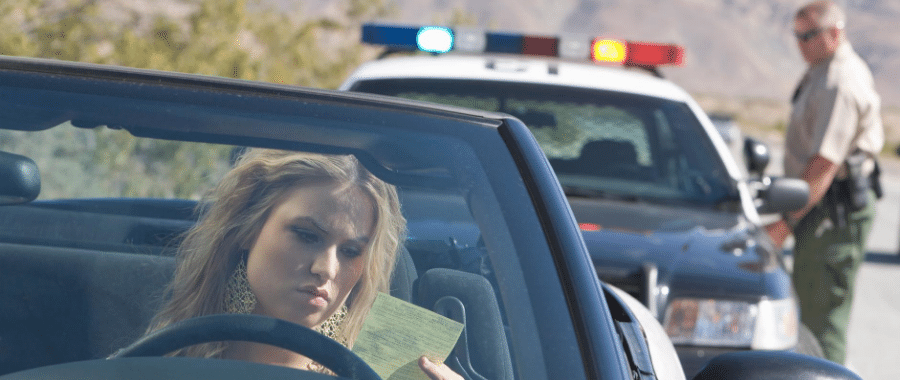5 Things NOT to Do After a Speeding Ticket in Colorado

Colorado takes speeding very seriously. Getting a ticket for speeding can result in expensive fines, potential jail time, high insurance rates, and points on your driving record. If you receive a speeding ticket in Colorado, there are things you should and shouldn’t do.
Here are 5 things NOT to do after a speeding ticket in Colorado:
1. Don’t Be a Habitual Offender
Colorado, like other states, has a sanction, known as the Habitual Traffic Offender Law, that can be imposed if they feel that your driving habits are threatening the safety of others.
If your driving habits are reckless and your behavior suggests that you don’t care about traffic laws, Colorado can revoke your driving privileges for five years. When that time is up, you will need to reapply for your license all over again.
How can you avoid being deemed a habitual offender?
- Don’t accumulate more than 10 convictions for major traffic violations over a seven-year period.
- Don’t plead guilty to three convictions for major traffic violations in a seven-year period.
- Don’t accumulate more than 18 convictions with three or less points over a five-year period.
2. Don’t Just Pay Your Speeding Ticket in Colorado
If you receive a speeding ticket in Colorado, you may be tempted to just pay the ticket and go on with your life. But there are consequences of simply paying a speeding ticket without fighting the charges.
Paying the ticket is an admission of guilt. It’s important to weigh your options and consider your decision carefully before paying your ticket. If you simply decide to just pay your ticket, you may have to deal with:
- Higher insurance rates
- Points on your driving record
- Insurance points
If the violation is serious enough, there is a risk that your driver’s license could be revoked. A fine isn’t the only thing you have to worry about.
In Colorado, a speeding violation of 1-24 mph over the speed limit is a Class A traffic infraction. A conviction of a Class A traffic infraction comes with potentially serious consequences:
- Minimum of 10 days in jail or a $150 fine, or both
- Maximum 90-day jail sentence or a $300 fine, or both
If you were traveling at 25 mph or more over the speed limit, you could face:
- Minimum of 10 days in jail or a $300 fine, or both
- Maximum 12-months in jail or $1,000 fine, or both
Surcharges are assessed for traffic violations, which will make your traffic ticket even more expensive.
Remember, paying your ticket is an admission of guilt. It’s less convenient to fight your ticket, but the end result (a dismissed ticket or reduced fine) may be more beneficial in the end. Weigh your options to determine whether the ticket is worth fighting. If it is a minor violation with a small fine, it may not be worth the time and expense to fight the ticket.
3. Don’t Overlook the Option of Traffic School
Some Colorado courts will allow you to take a defensive driving course if you have been convicted of a traffic violation. Taking the course may dismiss your traffic ticket and avoid having points added to your driving record.
Many defensive driving courses can be taken online, and the goal of the course is to learn how to be a better driver.
If you have the option of going to traffic school in exchange for having the ticket dismissed, it’s worth considering. Although inconvenient, taking the course may help you avoid fines or points on your record.
4. Don’t Fight Your Ticket Alone
If you plan to fight your speeding ticket in Colorado, don’t do it alone. An attorney will provide legal counsel, help you determine the best course of action, and help you achieve the best possible outcome.
There are many possible defenses for a traffic ticket, and a Colorado attorney can determine which argument will achieve the best results. An attorney’s help may get the ticket dismissed or the violation reduced.
When the stakes are high, it’s even more important to seek legal representation to avoid costly fines and the loss of driving privileges.
5. Don’t Repeat the Offense
It’s important to avoid being a habitual offender, as discussed earlier. If you receive a ticket for speeding in Colorado, learn from your mistake and avoid speeding in the future.
Speeding increases the risk of accidents and injuries.
“From the stats we have, we’ve learned there is a significant correlation between speeding and injury traffic crashes,” says Lt. Thompson of the Colorado Springs Police Department.
Practicing safe, defensive driving habits can help you avoid future speeding tickets and reduce the risk of an accident. Repeat speeding offenses will only result in more costly fines and the risk of losing your license.
If you have received a speeding ticket in Colorado, call a Colorado Traffic Lawyer right away. An attorney will help you determine whether it’s worth fighting the ticket and help you achieve the best possible outcome for your case.

